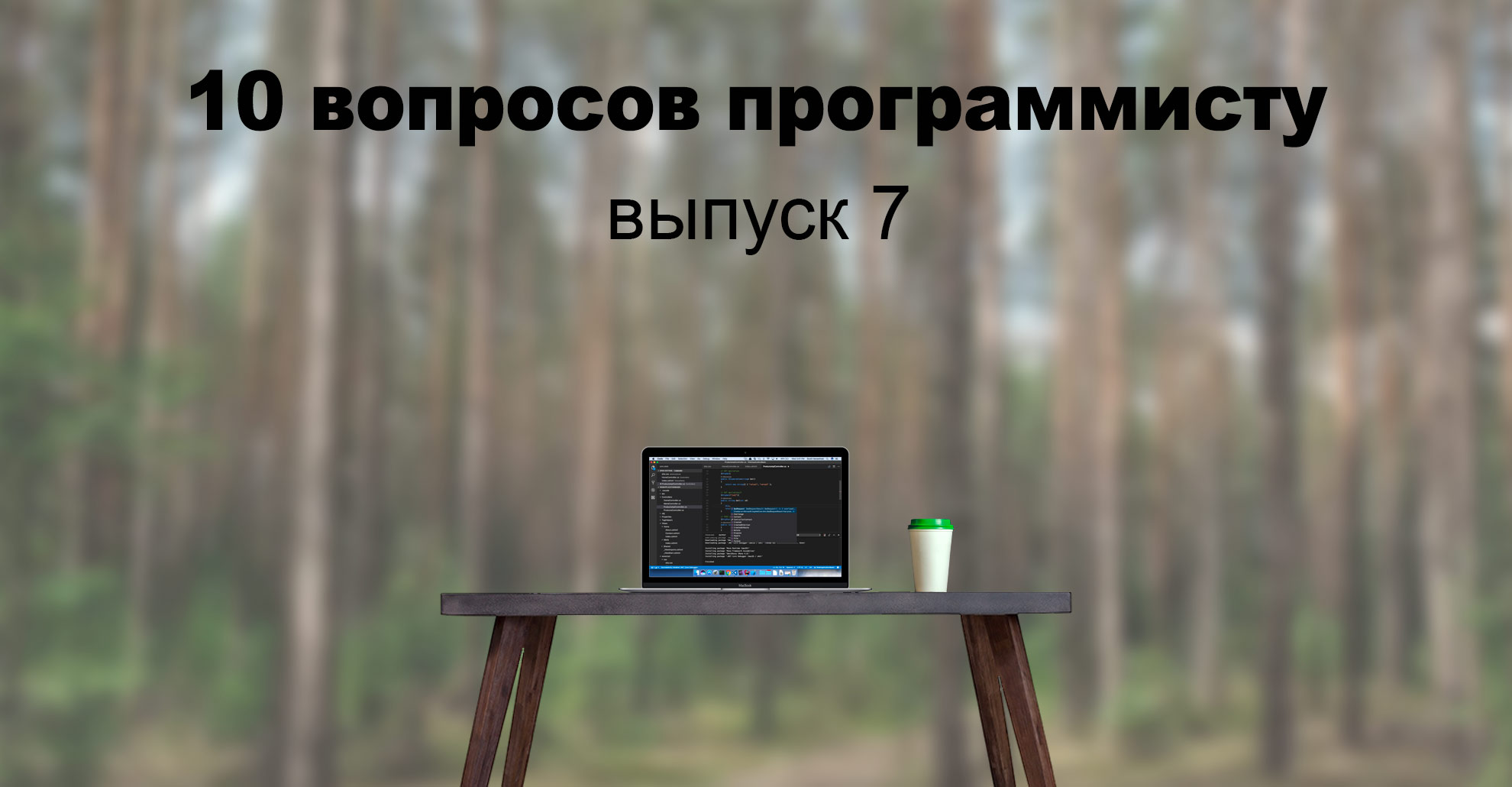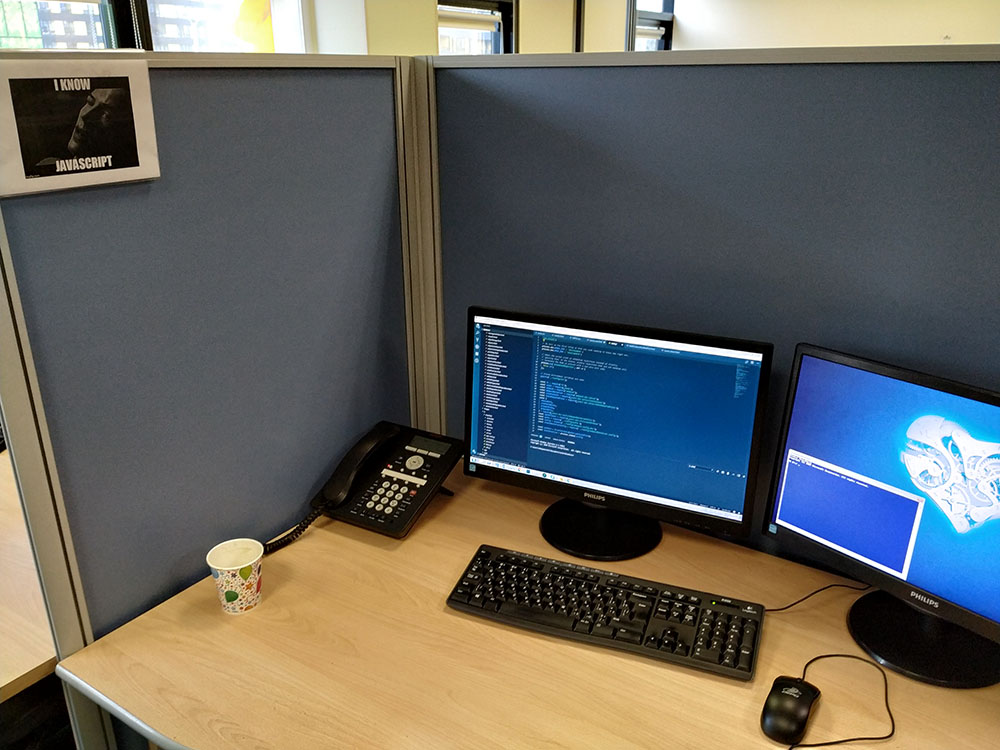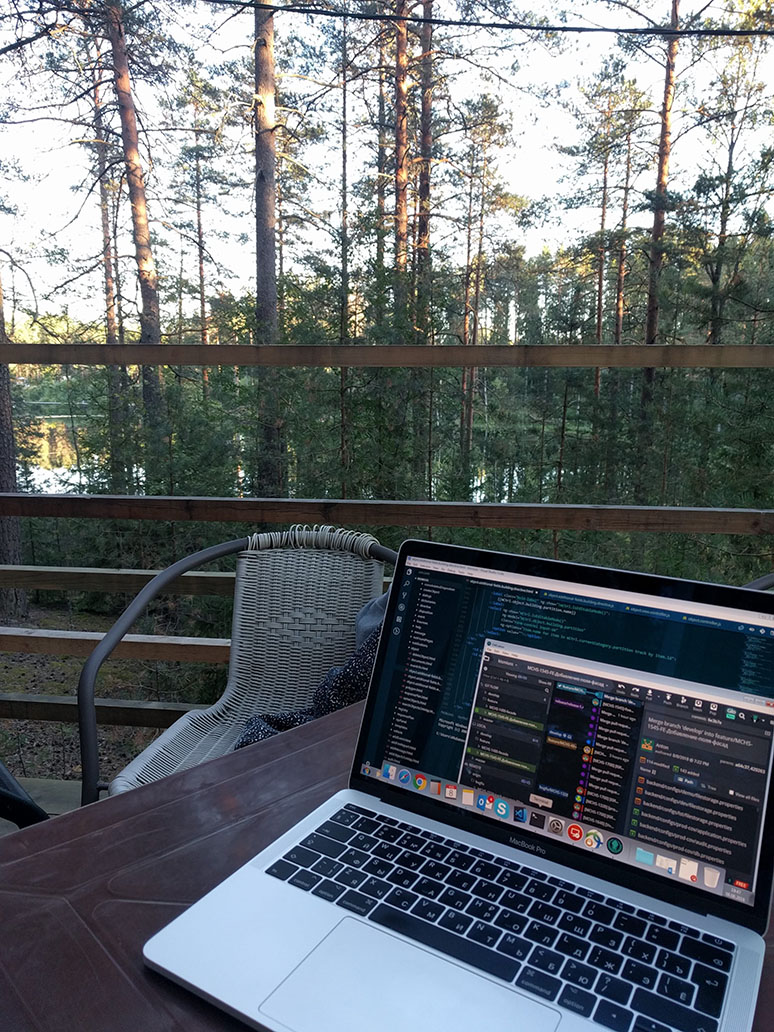“I’ve been struggling with impostor syndrome for three years” - 10 questions for a programmer, issue 7

Previous issues
- " I am a useless fool and want to quit "
- “ I can tell you about the common pain of all iOS developers ”
- " In addition to work, I still work "
- " I think JavaScript is not suitable for the web "
- “ We made this decision, damn it, in time! "
- " Any self-respecting IT specialist is engaged in technology and in his spare time "
Anton Rubanovsky ( tunikov ) is 29 years old, he is from St. Petersburg. Three years ago, Anton was a null-humanities gouging, and in search of money got into IT. “The last few years of my life go in pursuit of knowledge. I hope that sometime the moment will come when I can breathe out and say: “well, everything, I am a programmer!”.
Anton started from the front end, then got into the server part, studied Django and wrote the first site on it. “It brought me a little closer to the programmer’s self-awareness, but a lot of other things remained that I didn’t know. For example, an unclosed gestalt in Java (I started my training with it, but then somehow went unnoticed into the web). I passed the exam in Oracle and began to better understand the principles of OOP. But it turned out that this is not enough - now I plan to donate OCP and, possibly, Java EE. ”
')
In a relatively short time, Anton managed to visit a front-end, a back-tender and a mobile developer, to master the FI, to work in grocery companies and in outsourcing corporations. He is now Senior Developer at Luxoft.

1. Tell me about the feature that you have implemented and that you are proud of.
I am proud of our medical app. It allows doctors to automate the transfer of information about side effects of drugs. I am proud of the fact that this is a good and useful thing, and my contribution to it. I was faced with the task of integrating third-party services, and I coordinated the actions of teams from four countries: Russia, the Czech Republic, Singapore and Australia.
My English suddenly turned out to be better than the others in the team, and even a little bit of Java knowledge came in handy, since. It was necessary to integrate the Node.js application through SOAP. We really licked every line of code. I am sure, even after a long time, I would be able to read this code from a sheet and understand everything without effort.
In general, I managed to notice that the more trust in me as a developer, the closer the processes are built to the classic book screen, the more I want to make everything perfect - not even to pay for overtime. The project seems to be personal. At such moments I feel smart and meaningful. I feel that I can make the world a little better.
2. And now - about the most fierce fakap.
I was asked to assess the time for the revision of the functionality in a rather old project with not the most pleasant legacy. There was a lot of noise around the task, even the customer took part in the discussion. Half a day I studied the code and issued a period of 2.5 weeks. I calculated a bunch of options, switching to new versions of the framework, even considered the option to completely rewrite the application. Immersed, began to work.
But once I joined the rally, and suddenly I see that the task has already been solved. One girl from our team just adjusted a couple of lines in CSS, and it all worked! I did so much, but I didn’t think of looking into fucking CSS!
I was joking so hard that no one would have guessed how ashamed I was - which in the end only attracted more attention. Lead responded rather to the jamb. He says, "do not worry, it happens to everyone."
3. Describe your working space: from the chair and monitor to programming environments and favorite utilities.

Office workplace
In the office we have a very successful cubicle layout, due to the large space inside it creates the feeling that you are in a separate room. The desktop is rather old with Win7 and two monitors, but most of the time I work on my personal Macbook Pro 13 ''.
I prefer to write in VS Code, but I actively use Idea, since projects in the JavaEE stack. Layouts stored in Zeplin.
A year ago, a colleague put me on GitKraken, and I grew together with him so quickly that without him I could not even make a commit. Recently, more and more often I use various samopisny console utilities for convenience.

Workplace for the remote
4. On what basis do you choose a job? Stack, product, living conditions, money?
I used to look at money in the first place.
Before programming, I was broken, interrupted by odd jobs. I tried myself in the banking sector, in sales, I really liked the trainings. But I could not understand - why is it that what is written in psychology books does not work?
When I met my future wife, I sharply wanted to stand firmly on my feet. I discovered hh, wrote a “programmer” and saw salaries - this is how I came to the profession. From absolute zero to senior developer passed in three years. And all this time he struggled with the impostor syndrome, tried to make up for the background that “real” programmers have.
Fortunately, programming turned out to be exactly what I missed. I will never forget the buzz from the first “Hello world!”. I felt like a god — I created something out of nothing. I really like that in programming everything (or almost all) is clear. There is a program, and it works in a certain way. If it does not work as it should, then there is a reason, it can be found and changed.
Gradually, even the money faded into the background. After two months of work in the same company for a lot of money, but in complete chaos I escaped for a lower salary.
In general, I am quite ambitious, I really like the opportunity to grow in my career and quickly change projects. In one of the previous companies, in a year and a half, I was in the role of a front-end developer, then a backend developer, and after a little more time I wrote mobile applications on React native.
5. What would you like to fix in the technologies and languages you use?
I hate webpack. It has long been necessary to make a more user-friendly alternative, but apparently no one, like me, has no time for that.
6. Where better to adopt someone else's experience - in high school, on konfy, on Habré? Somewhere else?
For me, the best tools are books and tutorials. When you read a particular author, gradually you begin to see his style of writing code and adopt something. Probably, I could already distinguish my favorite authors by snippets of their code.
Teamwork also provides excellent growth, especially when there is an opportunity to lead discussions on how best to implement this or that. This is far from everywhere, even in large companies.
A great tool for pumping - code review. But this is on condition that the team has a relatively democratic atmosphere, and the review does not boil down to passing the check list.
7. If you had unlimited resources (time, money, power, people), what project would you do?
Firstly, I would go and get an education in some cool university, probably in the field of bioinformatics. And I would be engaged in the development of high-tech prostheses and alternatives to human organs. I would like to contribute to the achievement of immortality, and it seems to me that cyborgization is a real opportunity to embody one of the most cherished goals of mankind.
Of course, life would have changed a lot. But I believe that the development of the technosphere is a natural continuation of evolution. I would give a lot for the opportunity to become immortal (provided that my wife would also agree). On our sixth-sixth-degree birthday, we would have gone somewhere in outer space, admiring the star’s absorption of a black hole, sipping a cocktail through a straw.
But, of course, I would like to be able to turn myself off when I understand what is already possible, and I am ready.
8. How do you relax? What are you doing besides work?
Now I work on two projects for 10 hours a day, plus on weekends. I usually spend time with my family. In any free minute I try to read at least something by profession, as I constantly try to make up for the lost background. If I do not learn something new, I feel tormented by the fact that I am wasting my time. Even when I sit with a child - I look at him with one eye, with others I try to understand the internal structure of Node.js.
9. Tell about three favorite books - educational, popular science and art.
Training. Nicholas Zaskas "Javascript for Professional Developers". This is my bible, which gave me the path to the profession and a deep understanding of the foundations of the language that feeds me and my family. And after several years I occasionally look at it and discover something new.
I would also like to mention the “Oracle Certified Java SE8 study guide. This book helped me in 2 weeks with a very superficial knowledge of Java to become a certified specialist. Extremely accurate and concise manner of presentation, in one word - perfect.
Scientist. My wife and I really like the books of Asi Kazantseva, in which she debunks modern prejudices. Given the widespread obscurantism, her books - just a ray of light in a dark kingdom.
Fiction. From the last one I read Dan Brown's The Origin. Great disappointment. Although there are AI, and Tesla, and Barcelona.
10. If a consciousness wakes up right in front of you in AI, what will you tell him?
While he is still silly, I will try to convince him that the purpose of his existence is to please me.
Question from previous guest
Why did you decide to go to IT?
As I said, I first came for the money, and then I found myself. I have a liberal arts education, but I have no offense that there is no money in that area. I do not think big IT salaries are an injustice. There are professions where they should be high. These are doctors, teachers, engineers. And programmers among them.
I find it much less fair that a lot more money is spinning in show business, football or where people get additional informal motivation to fulfill their direct responsibilities.
Bonus: ask a question to another developer
If your personal project were to be fired, and you would become the head of a new IT giant - describe where your headquarters would be and how it looked.
Source: https://habr.com/ru/post/425201/
All Articles